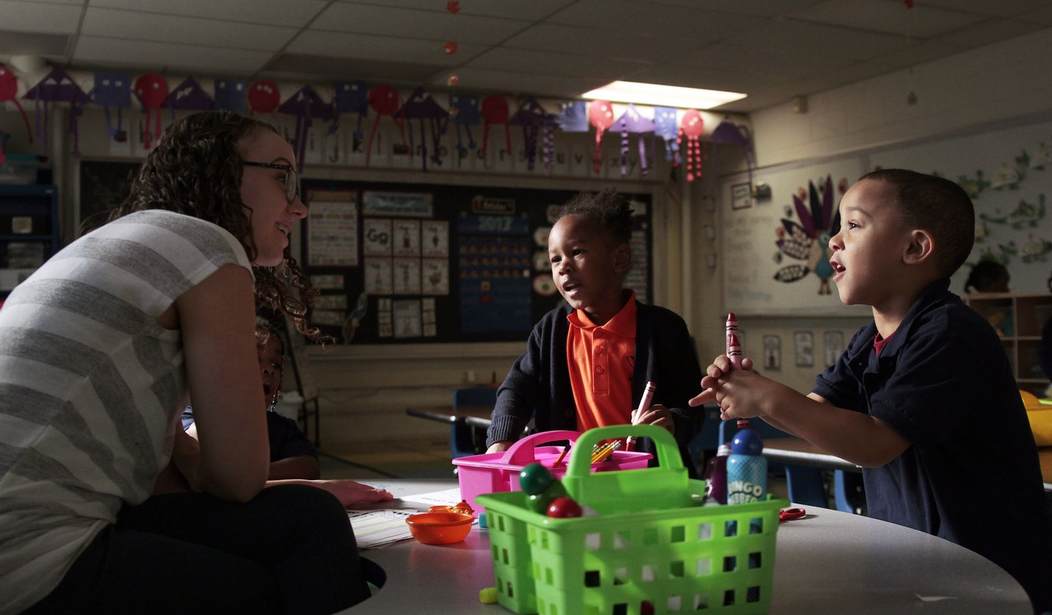Kids who attend New York City's Success Academy charter schools do remarkably well.
"We are No. 1 in student achievement in the state," says founder Eva Moskowitz, "outperforming all the wealthy suburbs."
They do. Although they teach mostly poor kids, 95 percent pass the state math test, and 84 percent pass the English test. Pass rates at government run schools are 38 and 41 percent. How does Success Academy do it?
For one thing, she keeps kids in class longer. Middle schoolers stay until 4:30 p.m.
Is that too much stress for kids, I ask?
"China and India are not worrying about the length of the school day," she replied. "We have to toughen up."
From what I saw, "toughening up" doesn't make kids hate school. Many told me they "look forward" to going to Success Academy in the morning. One called school "rockin' awesome!"
"Kids like succeeding," explains Moskowitz.
Despite this success, or because of it, the education establishment hates Moskowitz.
When she tries to open new schools, activists protest. New York City's Mayor Bill de Blasio complained, "It's time for Eva Moskowitz to stop having the run of the place!"
"Why do they hate you?" I asked.
"What we prove is that there's nothing wrong with the children," she replied. "There is something wrong with a system, a monopolistic system that is not allowing kids to succeed."
Mayor de Blasio got his political start as a socialist, has praised Cuba and Venezuela, and isn't fond of competition. To protect New York City's taxi industry, he tried to block Uber and Lyft.
He doesn't understand that competition helps more people than it hurts.
Recommended
Some specific criticisms of charters like Success Academy:
Criticism No. 1. They are "a scam," says "Young Turks" TV commentator Nomiki Konst, "better funded -- by these hedge funders -- and they're performing worse than underfunded schools."
But Konst is wrong. Charters like Success Academy do more with less. New York City's regular public schools get $20,000 per pupil.
"I only get $14,500," says Moskowitz.
Criticism No. 2. They get better results because they just accept better students. They skim the cream off the top.
"Simply not true," replied Moskowitz. "We admit by random lottery."
That's also true. But one educator who watched my YouTube video on Success Academy emailed me with Criticism No. 3: "Only certain parents enter lotteries. You don't have the homeless kids, foster kids, kids whose parents are in jail."
Fair point. I asked Moskowitz about that.
"Most of our kids are from very poor families," she replied. "Yet they significantly outperform kids from suburbs ... where the average household income is eight or nine times what our families earn."
And even some homeless kids flourish at her schools, she says. "About 1 in 10 of our scholars are homeless, yet 97 percent of them passed the state math exams and 84 percent passed reading."
Criticism No. 4: Charters kick out problem kids or "counsel them out." They demand so many meetings with parents that parents eventually withdraw their kids.
But "our retention rate's higher than the city schools'!" answered Moskowitz. She's right. Only 10 percent of kids leave her schools, while 13 percent leave regular schools before completion.
Criticism No. 5: Some charters turn out to be worse than government-run schools. That's true. But the beauty of choice (a market) is that the good schools grow while inferior ones close. For years, bad government schools never closed.
In her new book, "The Education of Eva Moskowitz," she explains that she's a Democrat who didn't always believe in school choice.
"I was blinded, I think, by a belief that big government was a good thing."
Now she knows better.
Many families also now know charters may be better. Parents line up for lotteries where government rations out the small number of admissions. Kids who don't get picked sometimes cry.
It's cruel and unnecessary for government to limit choice this way, but many politicians have an investment in maintaining the power of bureaucrats and teacher unions.
Thankfully, some kids will have better lives because people like Eva Moskowitz fight the system.

























Join the conversation as a VIP Member